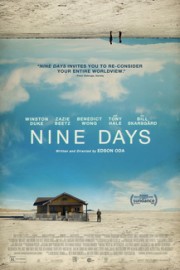Nine Days
**Seen at the 2021 Atlanta Film Festival.
Amanda lingers like a specter over Edson Oda’s “Nine Days.” She is barely seen except through her point-of-view, and her death leaves many questions unanswered. It also informs everything Will does in the film, until Emma shows him a different way. How does she do this? By showing that life doesn’t have to be experienced through cynicism and frustration, and joy offers so much more.
Imagine if Terrence Malick had made a live-action amalgam of the themes of “Inside Out” and “Soul” (of course, he has, but suppose it had Pixar’s imaginative world building), and you have a pretty good idea of what “Nine Days” is about. If the emotions feel at a distance, it’s because Will, the main character played by Winston Duke, is afraid to put his on display. He is an interviewer. Who is he interviewing? Candidates for the opportunity to live. He has six prime candidates in front of him, and he will put them through a series of moral questioning and observant tests to decide who will get a chance to exist, and who will just fade into the ether; the whole process takes nine days. Amanda was one of his selections, whom he watches on a wall of televisions like an empathetic Big Brother. A brilliant musician, she is his pride and joy. She dies the day of a big concert where she will be the featured soloist, and it shocks him to his core- if her death was deliberate on her part, how could he miss the signs? And what does it say about him as an interviewer that he thought she was the best choice if she could do this?
Will’s home/office is one of the most beautiful pieces of individual set design in recent memory. The televisions are not modern, but out of the ’50s and ’60s. He has his subjects write their thoughts and observations in journals, and he wears a sweater vest. How did Will choose this decor for his home? In the world of the film, interviewers had to have lived life. It’s never spelled out what exactly happened to Will, but could it be that he lived through the ’50s and ’60s and segregation in America? His experiences in life certainly inform how he views his candidates. One of the earliest ones he eliminates, Mike (David Rysdahl), is a deep soul, and a wonderful artist; is the reason Will doesn’t choose him because he worries the world will spit Mike out like he observes with Ricky, a past selection who is constantly bullied? Alex (Tony Hale) doesn’t seem to take life seriously enough, even when faced with possible death or paralysis. Maria (Arianna Ortiz) is fragile, as well, and wearing your emotions on your sleeve like she does is dangerous. Kane (Bill Skarsgård) is a bit more cynical and seeing of the cruelty of the world; he is an alpha personality that, for Will, displays toughness where he might survive. The wild card is Emma (Zazie Beetz), who showed up late to the first meeting with Will, and doesn’t answer his questions the way the others do. Is it because she is someone who wants to be in the moment, and simply exist? She has a fan in Kyo (Benedict Wong); he is not an interviewer because he did not live, nor did he disappear, either. He is a friend to Will, and helps him in his attempts to recreate one moment that those not chosen observed over their time before they vanish. Not every interviewer does this; just Will. If we know nothing else about Will, this tells us a great deal about him; most importantly, that the simple pleasures of life, those that sometime provide the most happiness, are not lost on him.
Winston Duke is becoming a favorite of mine, between this, “Black Panther” and “Us.” He shows us more range of emotions in those two films, but in “Nine Days,” he shows us a man who takes his responsibilities seriously, and methodically reaches unemotional conclusions. Are his conclusions devoid of emotion, though? Is it that he truly does not see those he eliminates as being good candidates for life, or is his own experience cautioning him against people who could be easily hurt by life? That’s what makes Emma such an anomaly among his candidates- she has a passion for experience that is kind of remarkable for someone who has never experienced life. The performances between the candidates are about showing us the range of human experience, while Duke and Wong (who is fantastic in this movie) are about observing people in life, and seeing it from a rational perspective (Duke’s) vs. an emotional one (Wong’s). In a movie that exists in a world separate from the real one, “Nine Days” captures more types of human behavior than a lot of films that strive for realism are capable of, and it does it with heart and more humor than you expect. The best way to take in this movie is just experience it, much in the same way Emma would do. She has a pretty good idea about how life is supposed to go.










